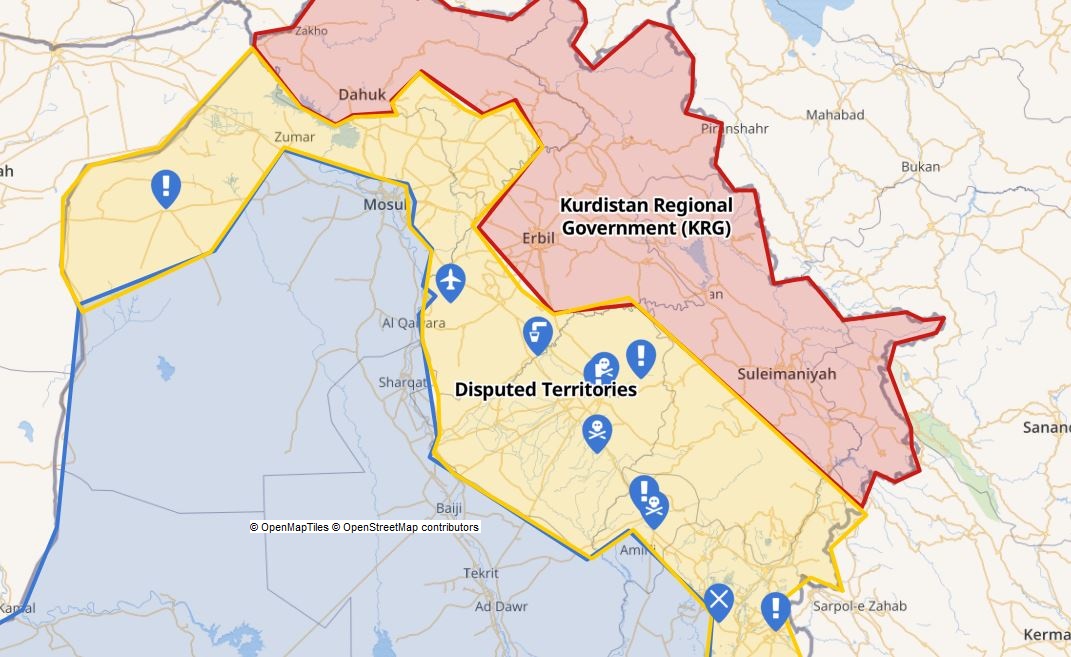1K
Kirkuk
- An investigative report by the Middle East Eye found that the alleged death of 13 police officers in Kirkuk by ISIS (Da’esh) was retaliation by a family of a little girl who was raped by police stationed near her village in Rashad subdistrict. The bloody attack on federal police on September 5 sparked a wide outcry among Iraqi officials, resulting in the launching of an investigative committee by the prime minister. The committee’s report revealed that the police officers had covered up the story and blamed Da’esh for the attacks. As the report revealed, among the deceased police officers, three had been involved in the sexual assault of the little girl.
- For the first time since its invasion of the Kurdistan region under the pretext of fighting the Kurdistan Workers’ Party (PKK), a Turkish drone struck a village between Qara Hanjir and Chamchamal, east of Kirkuk city. As a result, two people were injured. Officials in Kirkuk declined to provide a comment on the attack to the media. Separately, Turkey’s defense minister announced the assassination of the PKK member who was reportedly “in charge of Kirkuk.”
- The Iraqi Prime Minister Mustafa al Kadhimi ordered an investigation into the torture of an Arab man (Hassan Mohammed, 30) by federal police members following his arrest. Three months after Mohammed’s arrest, his family found out he was in the hospital recovering from surgery for injuries sustained during torture. Kirkuk’s federal police took charge of the region on October 16, 2017 when Baghdad used Iranian-backed militias to remove Kurdish forces.
- Oil exports from Kirkuk to Jordan resumed in September after eleven months of interruption, the State Organization for Marketing of Oil (SOMO) said. According to the statistics from September, 275,274 oil barrels have been exported to Jordan from the Kirkuk field, averaging 9,176 barrels per day. SOMO’s report also included that the crude export from the Kirkuk fields saw an increase of 193,822 barrels in September, totaling 3,198,131 barrels. Kirkuk’s crude exports also included 2,922,857 barrels to international markets via the Cihan pipeline to Turkey. The exports of September grossed 209,607,455.5 US dollars.
- The election fever in Kirkuk peaked this past week as tensions between political party candidates heavily increased campaigning before the upcoming election on October 11. In the second electoral district which includes Kirkuk city, the Patriotic Union of Kurdistan (PUK) female candidate Dr. Ashit Mehdi rejected her party’s request to withdraw her candidacy to increase the chance of their male candidate winning a seat in the district. In the Hawija district, the Obaidi candidate Burhan Mozher al Asi announced his withdrawal to unite the tribe’s vote and increase the chances of another Obaidi tribe candidate winning. The al Obaidi tribe are competing with candidates of the al Jabour tribe. The election laws prevent candidates from withdrawing 30 days ahead of the election, but some candidates stopped campaigning in a sign of withdrawal. The parliamentary election, which will be held on Sunday, divides electoral districts in each province based on population, unlike previous laws where each province presented a district. While all of the ethnic components, Kurds, Arabs, Turkmen, have struggled to unite their votes under few candidates, the Turkish-backed Turkmen Front brought back nearly 250 Turkmen families from abroad before elections, attempting to increase their votes. Furthermore, several Kurdish, Sunni, Arabs, Shia Arabs political leaders visited Kirkuk for the campaign last week, including Hadi al Ameri, the head of the Iranian-backed Badr organization, Qubad Talabani, head of the PUK-Gorran coalition, and Khamis Khanjar, the Sunni Arab leader backed by Turkey. Meanwhile, the President of the Kurdistan region, Nechirvan Barzani, called on the federal government to implement article 140 and normalize Kirkuk’s situation during a speech delivered to a crowd of Kurdistan Democratic Party (KDP) campaign for elections. The competition among Kirkuk’s ethnic groups is mostly within second distinct while the first district is majority Kurds and the third is expected to go to Arabs.
Khanaqin
- “Long live Da’esh” was found written on four public walls between Khanaqin and Qara Tapah. Given increased terrorist attacks in the region, the Iraqi National Security accused Da’esh sleeper cells of the act.
- The police announced the arrest of three people involved in tearing down posters of election candidates. The police did not reveal their identity, but tensions have arisen in the recent week between the parties ahead of the Sunday election.
Tuz Khurmatu
- On Sunday, October 3rd, Da’esh terrorists attacked a military checkpoint near al Sarha bridge, killing two soldiers and wounding two others. After the attack, the Kirkuk-Baghdad road was shut down for hours. On the same night, Da’esh launched an attack on the Iraqi military near Zarga, injuring a soldier with a sniper rifle.
- The local police announced the arrest of a drug-dealing group, consisting of three men and two women, in a raid near Hamrin Mountain. The police confiscated five kilos of weed from the group.
Makhmour
- On Friday, October 1st, US-led coalition airstrikes targeted the Qara Chokh mountains where Da’esh is headquartered in the region. Simultaneously, the security forces in Makhmour, were put on alert.
Shingal
- The mayor of Shingal, Mehma Khalil said that the PKK offshoot, the Sinjar Resistance Units (YPJ), prevented two KDP candidates from entering the town to campaign. Mayor Khalil called on the Iraqi government to intervene and prevent future incidents against the KDP candidates. Both KDP and the United Nations Envoy to Iraq, Jeanine Antoinette Hennis-Plasschaert, denounced the YPJ’s move.

